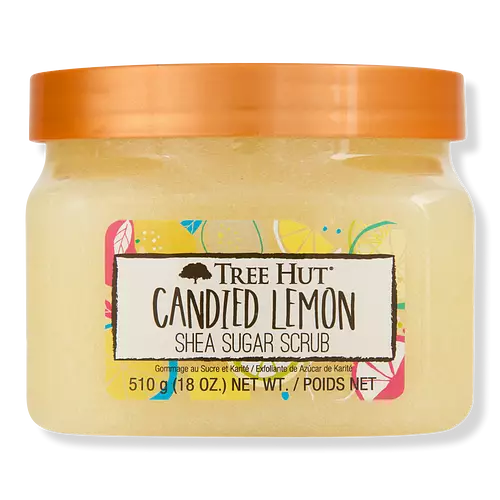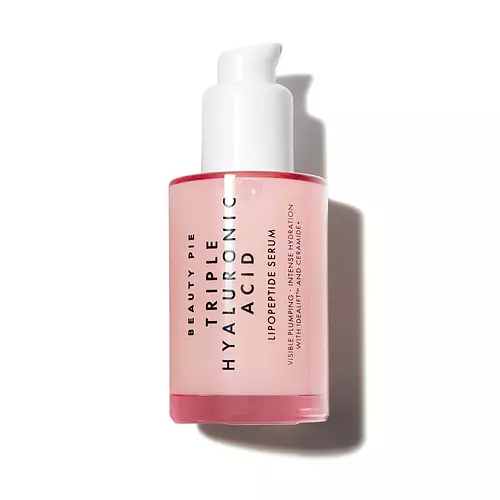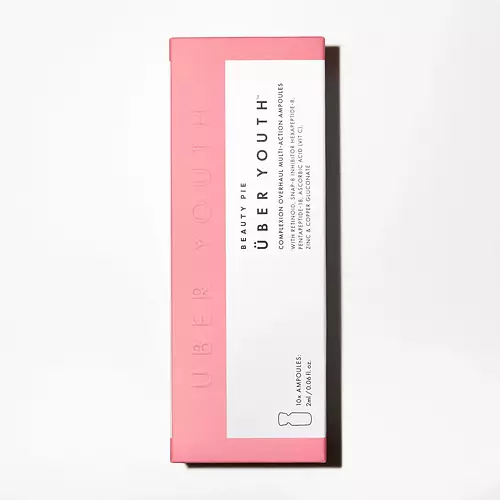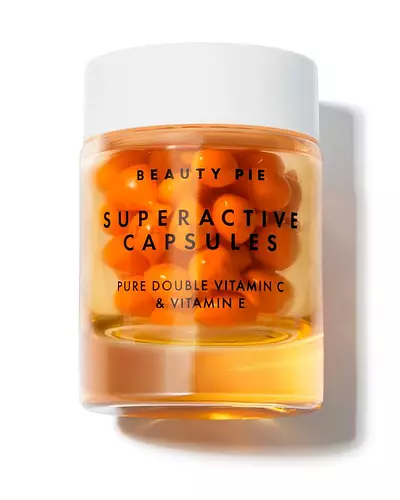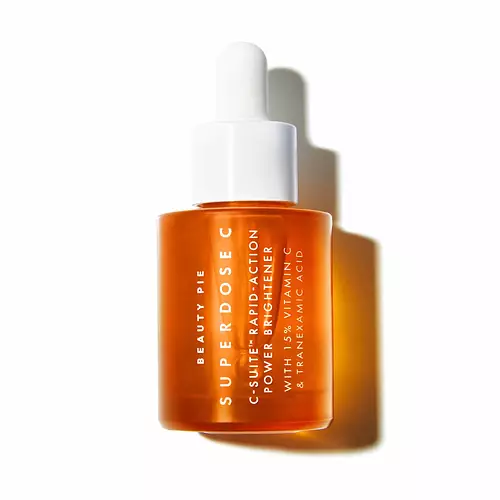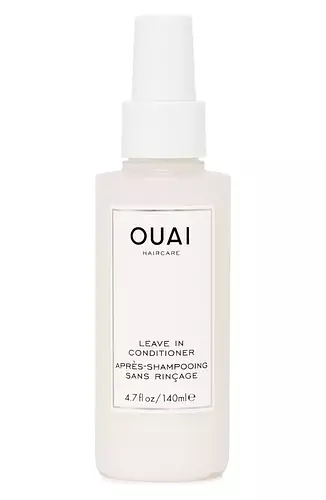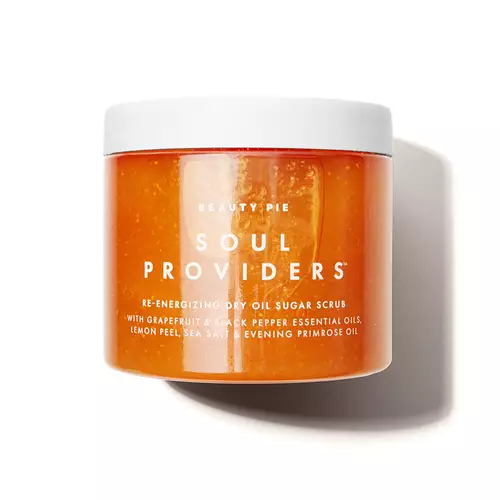
Beauty Pie Soul Providers Re-Energizing Dry Oil Sugar Scrub Ingredients Explained
Published on May 31, 2023 Submitted by Butter
Overview
What it is
Body scrub with 20 ingredients that contains Vitamin E
Cool Features
It is cruelty-free and reef safe
Suited For
It has ingredients that are good for anti aging, dry skin, brightening skin, sensitive skin and scar healing
Free From
It doesn't contain any harsh alcohols, parabens, silicones or sulfates
Fun facts
Beauty Pie is from United States.
We independently verify ingredients and our claims are backed by peer-reviewed research. Does this product need an update? Let us know.
Body scrub with 20 ingredients that contains Vitamin E
Quick info
You should know
Notable Ingredients
This product contains 1 ingredient that may have this attribute:
Benefits
This product contains 2 ingredients that may have this attribute:
This product contains 1 ingredient that may have this attribute:
This product contains 1 ingredient that may have this attribute:
This product contains 1 ingredient that may have this attribute:
This product contains 1 ingredient that may have this attribute:
Concerns
This product contains 2 ingredients that may have this attribute:
This product contains 1 ingredient that may have this attribute:
This product contains 2 ingredients that may have this attribute:
Ingredients 20
Prunus Amygdalus Dulcis Oil comes from the sweet almond, a tree native to Iran. This oil has no fragrance and is non-volatile.
Sucrose is a natural sugar found in fruits, vegetables, and nuts. It is the main constituent of white sugar.
Persea Gratissima Oil is made by pressing dehydrated avocado fruit from the tree Persea gratissima, Lauraceae.
Glycine Soja Oil comes from the soybean. Glycine Soja is native to eastern Asia.
Parfum is a catch-all term for an ingredient or more that is used to give aroma to products. Parfum, or fragrance, can be a blend of hundreds of chemicals or plant oils. This means every product with "fragrance" or "Parfum" in the ingredients list is a different mixture.
Prunus Armeniaca Kernel Oil is oil from the kernels of the Apricot, Prunus armeniaca L., Rosaceae. This oil is non-fragrant and non-volatile.
Limonene is a fragrance that adds scent and taste to a formulation.
Oenothera Biennis Oil is the fixed oil derived from the seeds of the Evening Primrose.
Water. It's the most common cosmetic ingredient of all. You'll usually see it at the top of ingredient lists, meaning that it makes up the largest part of the product.
Tocopherol (also known as Vitamin E) is a common antioxidant used to help protect the skin from free-radicals and strengthen the skin barrier. It's also fat soluble - this means our skin is great at absorbing it.
Propylene Glycol is an odorless, colorless liquid. As a humectant, it helps skin retain moisture. It also aids in delivering active ingredients.
Farnesol is a compound extracted from essential oils such as lemongrass, rose, and more. It is used as a fragrance in products to help boost floral scents.
Linalool is a fragrance and helps add scent to products. It's derived from common plants such as cinnamon, mint, citrus, and lavender.
Citral is a fragrance and used to add a lemon-like scent to products. It is both naturally found in plants and created synthetically. In plants, it is commonly occurring in lemon myrtle, lemongrass, lemon tea-tree, lemon verbena, and other citruses.
Leuconostoc/Radish Root Ferment Filtrate is a natural preservative. It comes from fermenting radish roots with a bacteria called leuconostoc. Leuconostoc comes from lactic acid. This bacteria is used to make the traditional Korean side-dish, kimchi. It is also used to make sourdough bread (both incredibly yummy foods).
Citric Acid is an AHA derived from citrus fruits (think oranges, lemons, and limes!).
Maris Sal, Prunus Amygdalus Dulcis Oil, Sucrose, Persea Gratissima Oil, Glycine Soja Oil, Parfum, Prunus Armeniaca Kernel Oil, Citrus Limon Peel Powder, Limonene, Oenothera Biennis Oil, Water, Tocopherol, Propylene Glycol, Farnesol, Linalool, Ocimum Tenuiflorum Extract, Phyllanthus Emblica Extract, Citral, Leuconostoc/Radish Root Ferment Filtrate, Citric Acid
Ingredient Ratings
Based on the number of likes and dislikes each ingredient has received.
Ingredients Explained
We don't have a description for Maris Sal.
Prunus Amygdalus Dulcis Oil comes from the sweet almond, a tree native to Iran. This oil has no fragrance and is non-volatile.
Almonds contain healthy fats, vitamins, and minerals. It is a rich source of Vitamin E, a great antioxidant and skin conditioning ingredient. Sweet almond oil contains fatty acids such as linolenic acid and triglycerides.
The content of sweet almond oil makes it a great emollient; it can help soften and hydrate your skin. Emollients create a barrier over your skin to trap moisture in. Sweet almond oil has antioxidant properties. This may help with anti-aging, as antioxidants help fight free-radicals. Free-radicals are unstable molecules that may damage your skin's cells.
Those with an almond allergy should be careful of this ingredient and speak with a professional about using it in your skincare.
This ingredient may not be fungal-acne safe.
Learn more about Prunus Amygdalus Dulcis OilSucrose is a natural sugar found in fruits, vegetables, and nuts. It is the main constituent of white sugar.
In skincare, sucrose is a humectant and can be a mild exfoliant.
Sucrose is hydrophilic, meaning it attracts water. This makes it an effective humectant and helps hydrate the skin.
Studies show sugars may worsen acne-prone skin due to it disrupting the skin's natural biome. We recommend speaking with a professional if you have any concerns.
In some products such as body scrubs, sucrose is used as an gentle exfoliant.
The term 'sucrose' comes from the french word for sugar, 'sucre'.
Learn more about SucrosePersea Gratissima Oil is made by pressing dehydrated avocado fruit from the tree Persea gratissima, Lauraceae.
Avocado Oil has antioxidant properties. Antioxidants help fight off free-radicals. Free-radicals are molecules that may damage your skin cells.
Avocado Oil is mostly made up of the glycerides of fatty acids. About 67% of these fatty acids is made up of oleic acid. Palmitic acid and linoleic acid are also present.
These fatty acids help hydrate and soften the skin. It may increase collagen content in the skin. Collagen helps keep your skin plump and firm.
Avocado Oil reduces inflammation and has not shown to clog glands.
Avocados also have B vitamins, vitamin K, vitamin C, vitamin E, and potassium.
Learn more about Persea Gratissima OilGlycine Soja Oil comes from the soybean. Glycine Soja is native to eastern Asia.
Soybean oil is an emollient. It is rich in antioxidants and fatty acids including palmitic, stearic, oleic, and linoleic acids.
As an emollient, the fatty acids in soybean oil helps keep your skin soft and hydrated. It does so by creating a film on top that traps moisture in.
Soybean oil is also rich in vitamin E, a potent antioxidant. Vitamin E is also anti-inflammatory and provides a soothing effect.
Studies show soy may help fade hyperpigmentation from UVB. It does so by disrupting the melanin process from UVB induced skin inflammation.
This ingredient may not be malassezia folliculitis, or fungal-acne, safe.
Soybeans are rich in proteins and are part of the legume family. Foods made with soybeans include tofu, soymilk, edamame, miso, and soy sauce.
Learn more about Glycine Soja OilParfum is a catch-all term for an ingredient or more that is used to give aroma to products. Parfum, or fragrance, can be a blend of hundreds of chemicals or plant oils. This means every product with "fragrance" or "Parfum" in the ingredients list is a different mixture.
In the US, the alternative name for parfum is 'fragrance'. The term 'fragrance' is not regulated in many countries. In many cases, it is up to the brand to define this term.
For instance, many brands choose to label themselves as "fragrance-free" because they are not using synthetic fragrances. However, their products may still contain ingredients such as essential oils that are considered a fragrance. One example is Calendula flower extract. Essential oil ingredients still impart a scent or 'fragrance'.
Depending on the blend, it can cause allergies and sensitivities on the skin. Some ingredients that are known EU allergens include linalool and citronellol.
Products use parfum often to give products a scent or cover up smells of different ingredients.
The bottom line is: not all fragrances/parfum/ingredients are created equally. If you are worried about fragrances, we recommend taking a closer look at an ingredient. And of course, we always recommend speaking with a professional.
Learn more about ParfumPrunus Armeniaca Kernel Oil is oil from the kernels of the Apricot, Prunus armeniaca L., Rosaceae. This oil is non-fragrant and non-volatile.
Apricot Kernel Oil is an emollient and helps soften skin. This is due to its fatty acid components. Some of these fatty acids include linoleic and oleic acid.
Apricot Kernel Oil also has antioxidant properties from Vitamins A, C, and E. Antioxidants help fight free-radicals. Free-radicals are molecules that may damage your skin cells. Besides being antioxidants, these vitamins provide plenty of skin benefits as well.
Learn more about Prunus Armeniaca Kernel OilWe don't have a description for Citrus Limon Peel Powder.
Limonene is a fragrance that adds scent and taste to a formulation.
It's found in the peel oil of citrus fruits and other plants such as lavender and eucalyptus. The scent of limonene is generally described as "sweet citrus".
Limonene acts as an antioxidant, meaning it helps neutralize free radicals.
When exposed to air, oxidized limonene may sensitize the skin. Because of this, limonene is often avoided by people with sensitive skin.
The term 'fragrance' is not regulated in many countries. In many cases, it is up to the brand to define this term. For instance, many brands choose to label themselves as "fragrance-free" because they are not using synthetic fragrances. However, their products may still contain ingredients such as essential oils that are considered a fragrance.
Learn more about LimoneneOenothera Biennis Oil is the fixed oil derived from the seeds of the Evening Primrose.
Evening primrose oil is rich in fatty acids. These fatty acids include linoleic (60-85%), oleic (5-12%), palmitic (4-10%), and stearic (2-4%).
The fatty acid composition makes it a great ingredient for soothing and moisturizing skin. However, it may not be Malassezia folliculitis, or fungal acne safe.
Further research is needed on the role of evening primrose in treating eczema.
Evening primrose is native to North America.
Learn more about Oenothera Biennis OilWater. It's the most common cosmetic ingredient of all. You'll usually see it at the top of ingredient lists, meaning that it makes up the largest part of the product.
So why is it so popular? Water most often acts as a solvent - this means that it helps dissolve other ingredients into the formulation.
You'll also recognize water as that liquid we all need to stay alive. Talk about multi-purpose! If you see this, drink a glass of water. Stay hydrated!
Learn more about WaterTocopherol (also known as Vitamin E) is a common antioxidant used to help protect the skin from free-radicals and strengthen the skin barrier. It's also fat soluble - this means our skin is great at absorbing it.
Vitamin E also helps keep your natural skin lipids healthy. Your lipid skin barrier naturally consists of lipids, ceramides, and fatty acids. Vitamin E offers extra protection for your skin’s lipid barrier, keeping your skin healthy and nourished.
Another benefit is a bit of UV protection. Vitamin E helps reduce the damage caused by UVB rays. (It should not replace your sunscreen). Combining it with Vitamin C can decrease sunburned cells and hyperpigmentation after UV exposure.
You might have noticed Vitamin E + C often paired together. This is because it is great at stabilizing Vitamin C. Using the two together helps increase the effectiveness of both ingredients.
There are often claims that Vitamin E can reduce/prevent scarring, but these claims haven't been confirmed by scientific research.
Learn more about TocopherolPropylene Glycol is an odorless, colorless liquid. As a humectant, it helps skin retain moisture. It also aids in delivering active ingredients.
Another role of this ingredient is preventing a product from melting or freezing. Propylene glycol also adds antimicrobrial properties to a product, elongating product lifespan.
This ingredient is considered an organic alcohol and commonly added into both cosmetics and foods.
Those with sensitive skin or conditions may deliver a rash when using this ingredient.
Learn more about Propylene GlycolFarnesol is a compound extracted from essential oils such as lemongrass, rose, and more. It is used as a fragrance in products to help boost floral scents.
Farnesol is a known EU allergen and causes contact dermatitis.
This ingredient is hydrophobic, meaning it is not soluble in water.
Learn more about FarnesolLinalool is a fragrance and helps add scent to products. It's derived from common plants such as cinnamon, mint, citrus, and lavender.
Linalool has the same effect as Limonene when exposed to air. Oxidized linalool can cause allergies and skin sensitivity.
Linalool has a scent that is floral, spicy tropical, and citrus-like.
Learn more about LinaloolOcimum Tenuiflorum Extract comes from the holy basil plant.
Holy basil has antibacterial, antifungal, and anti-inflammatory properties. It naturally contains fragrances such as linalool.
Holy basil is rich in vitamins A and C, calcium, zinc, and iron.
Learn more about Ocimum Tenuiflorum ExtractWe don't have a description for Phyllanthus Emblica Extract.
Citral is a fragrance and used to add a lemon-like scent to products. It is both naturally found in plants and created synthetically. In plants, it is commonly occurring in lemon myrtle, lemongrass, lemon tea-tree, lemon verbena, and other citruses.
The EU mandates Citral be listed separately as a fragrance. It is a known allergen and may cause contact dermatitis. Citral can also used as a masking ingredient.
The term 'fragrance' is not regulated in many countries. In many cases, it is up to the brand to define this term. For instance, many brands choose to label themselves as "fragrance-free" because they are not using synthetic fragrances. However, their products may still contain ingredients such as essential oils that are considered a fragrance.
The term 'citral' is a collective term for two geometric isomers: geranial/Citral A and neral/Citral B.
Learn more about CitralLeuconostoc/Radish Root Ferment Filtrate is a natural preservative. It comes from fermenting radish roots with a bacteria called leuconostoc. Leuconostoc comes from lactic acid. This bacteria is used to make the traditional Korean side-dish, kimchi. It is also used to make sourdough bread (both incredibly yummy foods).
Leuconostoc/Radish Root Ferment Filtrate has antimicrobial properties and helps prevent the growth of bacteria in a product.
It is believed the preservation property comes from salicylic acid and ammonium salt, neither of which are involved in the fermentation process.
Learn more about Leuconostoc/Radish Root Ferment FiltrateCitric Acid is an AHA derived from citrus fruits (think oranges, lemons, and limes!).
If you spot Citric Acid near the end of an ingredient list, it's likely there as a pH adjuster rather than an active ingredient.
As an AHA, Citric Acid removes the top layer of skin cells from the newer layer of skin underneath. This helps skin to remove dark spots and look more even.
Read more about some other popular AHA's here:
Learn more about Citric AcidWhen to use
How this product is used by our community
Directions
Apply on skin and scrub all over the body.
Apply on skin and scrub all over the body.
Compared With
Here are some products that it's often compared with
More Beauty Pie Products
See all Beauty Pie productsMore Body Scrubs
See all body scrubsWe're dedicated to providing you with the most up-to-date and science-backed ingredient info out there.
The data we've presented on this page has been verified by a member of the SkinSort Team.
Read more about us

